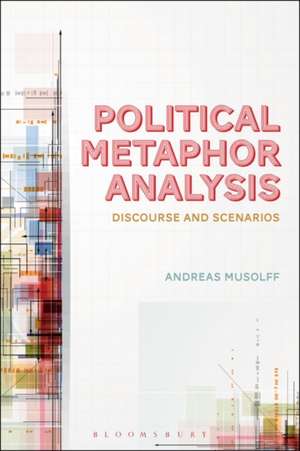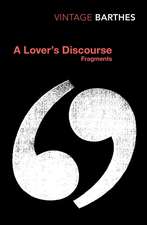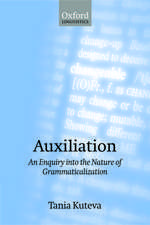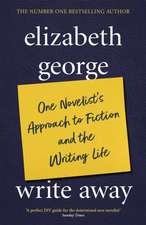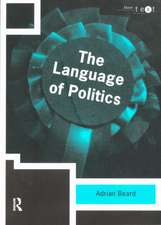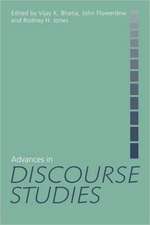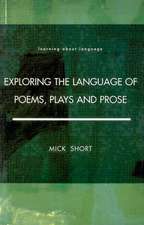Political Metaphor Analysis: Discourse and Scenarios
Autor Professor Andreas Musolffen Limba Engleză Paperback – 24 aug 2016
| Toate formatele și edițiile | Preț | Express |
|---|---|---|
| Paperback (1) | 235.75 lei 43-57 zile | |
| Bloomsbury Publishing – 24 aug 2016 | 235.75 lei 43-57 zile | |
| Hardback (1) | 948.34 lei 43-57 zile | |
| Bloomsbury Publishing – 24 aug 2016 | 948.34 lei 43-57 zile |
Preț: 235.75 lei
Preț vechi: 268.53 lei
-12% Nou
Puncte Express: 354
Preț estimativ în valută:
45.11€ • 47.23$ • 37.33£
45.11€ • 47.23$ • 37.33£
Carte tipărită la comandă
Livrare economică 07-21 aprilie
Preluare comenzi: 021 569.72.76
Specificații
ISBN-13: 9781441160669
ISBN-10: 1441160663
Pagini: 208
Dimensiuni: 156 x 234 x 19 mm
Greutate: 0.59 kg
Editura: Bloomsbury Publishing
Colecția Bloomsbury Academic
Locul publicării:London, United Kingdom
ISBN-10: 1441160663
Pagini: 208
Dimensiuni: 156 x 234 x 19 mm
Greutate: 0.59 kg
Editura: Bloomsbury Publishing
Colecția Bloomsbury Academic
Locul publicării:London, United Kingdom
Caracteristici
Theoretical issues are applied to empirical data drawn from a multilingual research corpus of metaphors.
Notă biografică
Andreas Musolff is Director of Research at the University of East Anglia, UK.
Cuprins
Acknowledgements 1.Introduction2. Political conflict as war2.1. Metaphors and concepts2.2. Inferences from metaphors in relation to conceptual domains2.3. Conceptual domains and metaphor corpora2.4. Discursive frames in metaphor corpora2.5. Summary2. Metaphors, cognitive models and scenarios3.1. Political metaphor and FAMILY models3.2. Two metaphor models - one domain?3.3. Family scenarios3.4. Further scenario functions3.5. Summary4. The life and gimes of a metaphor scenario: Britain at the heart of Europe4.1. Memories of a metaphor4.2. The emergence of a metaphor scenario4.3. Scenario development4.4. Scenarios and blends4.5. Summary5. The belly and the body politic5.1. Memories of a fable5.2. The body politic tradition5.3. Body politic, corps politique, politischer Korper: Traces of national discourse tradition in metaphor usage. 5.4. Historical explanations for the development of metaphor scenario5.5. Summary6. Parasites, scrounging, and the question of deliberate metaphor6.1. Parasites, metaphor and etymology6.2. Metaphorizations 'back and forth'6.3. Metaphor and racism6.4. Immigrants as 'parasites'6.5. Metaphors as deliberately chosen scenario elements6.6 Summary7. Nations as persons: collective identity-construction7.1. Introduction: speaking for a nation7.2. From 'extended hands' to a 'new Nakba' in eight speeches7.3. Nations as persons with social identities7.4. Two case summaries7.5. Summary8. Understanding political metaphor8.1. The unpredictability of metaphor as understanding8.2. Interpretations of the NATION AS BODY metaphor8.3. Interpretations of the NATIONS AS PERSON metaphor8.4 SummaryAppendix IAppendix IIAppendix IIINotesBibliographyIndex
Recenzii
An engaging and provocative text ... I would recommend it not only to researchers of political discourse, but also to those who are interested in the persuasive power of metaphor in audience reception.
The author clearly feels strongly about the ideological implications of metaphorizing and writes in an engaging, pleasant style. Undoubtedly, therefore, this book will enthuse a new generation of students with interests straddling metaphor theory, critical discourse analysis, and pragmatics.
The book makes a convincing case for a discourse-historical approach in the study of political metaphors. In terms of structure and presentation, [it] is well-organized and shows a high degree of coherence and linguistic consistency. I am confident that the book will gain great interest and will motivate further studies on metaphors using the scenario-oriented approach.
Andreas Musolff's book takes great strides in Political Metaphor Analysis, exploring a wealth of exciting discourses to rethink old and define new research avenues. A must-read for students, cognitive scientists and critical scholars of all persuasions.
This is an amazingly informative and fascinating book on political metaphor. It teaches us about the significance and enormously complex reality of the use of metaphor in politics - and beyond. In doing so, it poses new challenges to our theories of how we think metaphorically.
Through an intriguing array of examples, Musolff provides a well-structured and interesting set of analyses of metaphoric language as used in the realm of current political discourse. He argues for the need to understand the historical, social, and political setting in which metaphors are used for the hearer/reader to appreciate their often powerful messages. This book builds on past work in metaphor theory, demonstrating an evolution to the next generation of analysis where generalities give way to careful consideration of more local and nuanced contexts. The result is a theoretical framework for the extended examples in the volume, but also a broader approach to contextualized metaphor which will serve well in a wide range of other semantic domains.
An insightful, clear and well-presented textbook - ideal for the classroom.
The author clearly feels strongly about the ideological implications of metaphorizing and writes in an engaging, pleasant style. Undoubtedly, therefore, this book will enthuse a new generation of students with interests straddling metaphor theory, critical discourse analysis, and pragmatics.
The book makes a convincing case for a discourse-historical approach in the study of political metaphors. In terms of structure and presentation, [it] is well-organized and shows a high degree of coherence and linguistic consistency. I am confident that the book will gain great interest and will motivate further studies on metaphors using the scenario-oriented approach.
Andreas Musolff's book takes great strides in Political Metaphor Analysis, exploring a wealth of exciting discourses to rethink old and define new research avenues. A must-read for students, cognitive scientists and critical scholars of all persuasions.
This is an amazingly informative and fascinating book on political metaphor. It teaches us about the significance and enormously complex reality of the use of metaphor in politics - and beyond. In doing so, it poses new challenges to our theories of how we think metaphorically.
Through an intriguing array of examples, Musolff provides a well-structured and interesting set of analyses of metaphoric language as used in the realm of current political discourse. He argues for the need to understand the historical, social, and political setting in which metaphors are used for the hearer/reader to appreciate their often powerful messages. This book builds on past work in metaphor theory, demonstrating an evolution to the next generation of analysis where generalities give way to careful consideration of more local and nuanced contexts. The result is a theoretical framework for the extended examples in the volume, but also a broader approach to contextualized metaphor which will serve well in a wide range of other semantic domains.
An insightful, clear and well-presented textbook - ideal for the classroom.
